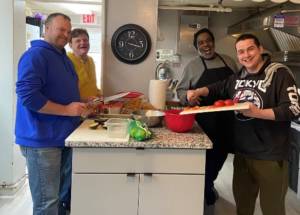
Pathway to Recovery provides transitional housing for Hoosiers impacted by substance use and mental disorders.
For residents at Pathway to Recovery, food from Second Helpings is a crucial part of building community.
Located downtown, Pathway provides transitional and permanent housing with support services for formerly homeless men overcoming substance use disorders. Once admitted, residents stay for a minimum of six months, where they receive 24/7 structure and support, before advancing to the next phase of programming.
The recovery landscape has changed over Pathway’s 30+ year history. “Twenty years ago, most of our residents were struggling with alcoholism and in their forties or fifties,” remembers Executive Director Sandy Jeffers, who has worked at the organization since 1994. “Today, residents are much younger – often in their twenties and thirties and are commonly dealing with an opioid addiction.”
Jeffers estimates of the 24 residents in their entry level program, 70% are struggling with opioid addictions and facing justice system barriers, and 65% are dually diagnosed with both substance use and mental health disorders, all of which must be addressed to prevent relapse.
“Most treatment facilities offer 30-day stays, but at Pathway we get to see lives transformed over the course of several months to several years.”
Residents often arrive at Pathway with nothing, so the staff works to provide basic needs, support and connections to services like primary care, mental health resources, employment placement and more. Before advancing to one of Pathway’s semi-independent or permanent housing programs, residents must be substance-free, stable, employed and financially self-sufficient. They must also give back by mentoring new residents beginning their recovery.
One of those basic needs is consistent access to nutritious food – and that’s where Second Helpings comes in.
Pathway to Recovery first learned about Second Helpings through residents who participated in the Culinary Job Training program. Since they became a partner agency in 2015, Second Helpings has provided more than 182,000 meals to Pathway, along with more than 70,000 pounds of additional food products.
This partnership means much more than meals at Pathway. Before partnering with Second Helpings, Pathway purchased groceries to prepare daily meals for residents.
“The partnership with Second Helpings saves thousands of dollars in food costs that we can put into other vital resident assistant services, like medication, transportation and housing support,” shares Larry Lynn, Director of Operations. “Now, there’s probably nothing that comes up that we can’t address.”
